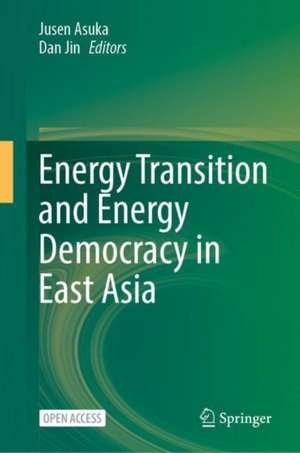Energy Transition and Energy Democracy in East Asia
Editat de Jusen Asuka, Dan Jinen Limba Engleză Paperback – 23 mar 2022
The subject of this book is to provide down-to-earth information on what kind of actions are being taken by the Government, Local community, Businesses, Researchers, NGOs on the energy transition in this region. It gives an updated picture of the energy transition in the East Asian countries, where the economic growth, as well as CO2 emission growth, is significant.
This book focuses not only on the technological perspective of the energy transition but also on the relationship between democracy and energy transition. Readers of this book can understand what kind of international support and pressure is needed to promote the energy transition in this region.
Since energy transition is needed not only for combatting climate change but also for the Green Recovery from the COVID-19 pandemic, publishing this book is very helpful to promote the Green Recovery and the Green New Deal world-widely.
| Toate formatele și edițiile | Preț | Express |
|---|---|---|
| Paperback (1) | 270.41 lei 38-44 zile | |
| Springer Nature Singapore – 23 mar 2022 | 270.41 lei 38-44 zile | |
| Hardback (1) | 419.21 lei 3-5 săpt. | |
| Springer Nature Singapore – 23 mar 2022 | 419.21 lei 3-5 săpt. |
Preț: 270.41 lei
Nou
Puncte Express: 406
Preț estimativ în valută:
51.74€ • 54.17$ • 42.81£
51.74€ • 54.17$ • 42.81£
Carte tipărită la comandă
Livrare economică 01-07 aprilie
Preluare comenzi: 021 569.72.76
Specificații
ISBN-13: 9789811902826
ISBN-10: 9811902828
Pagini: 117
Ilustrații: IX, 117 p. 1 illus.
Dimensiuni: 155 x 235 mm
Ediția:1st ed. 2022
Editura: Springer Nature Singapore
Colecția Springer
Locul publicării:Singapore, Singapore
ISBN-10: 9811902828
Pagini: 117
Ilustrații: IX, 117 p. 1 illus.
Dimensiuni: 155 x 235 mm
Ediția:1st ed. 2022
Editura: Springer Nature Singapore
Colecția Springer
Locul publicării:Singapore, Singapore
Cuprins
Chapter 1. Challenging the Transition of Civilization – Theory and Practice of “Energy Democracy.- Chapter 2. Global Trend - How to overcome a combination of crises?.- Chapter 3. Energy Democracy for Energy Transition in South Korea?: Focusing on Politicization of Media.- Chapter 4. China’s Energy Transition: How to Overcome Financial, Societal, and Institutional Challenges in the Long Term.- Chapter 5. Energy Democracy and Energy Transition in Taiwan.- Chapter 6. Japanese Green New Deal to Bring Happiness and Prosperity.- Chapter 7. Transboundary cooperative governance toward energy transition in East Asia, A review of historical development and future perspective.
Notă biografică
Jusen Asuka
Center for Northeast Asian Studies , Tohoku University, Sendai, Miyagi, Japan
Dan Jin
Dan Jin
Center for Northeast Asian Studies , Tohoku University, Sendai, Miyagi, Japan
Textul de pe ultima copertă
This is an open access book.
The subject of this book is to provide down-to-earth information on what kind of actions are being taken by the Government, Local community, Businesses, Researchers, NGOs on the energy transition in this region. It gives an updated picture of the energy transition in the East Asian countries, where the economic growth, as well as CO2 emission growth, is significant.
This book focuses not only on the technological perspective of the energy transition but also on the relationship between democracy and energy transition. Readers of this book can understand what kind of international support and pressure is needed to promote the energy transition in this region.
Since energy transition is needed not only for combatting climate change but also for the Green Recovery from the COVID-19 pandemic, publishing this book is very helpful to promote the Green Recovery and the Green New Deal world-widely.
Caracteristici
This book is open access, which means that you have free and unlimited access Presents the current and future energy/climate policy in this important as well as the interesting region. Covers the Green Recovery/Green New deal from the COVID-19 pandemic. A good combination of authors includes academics, think tanks, and NGOs.
